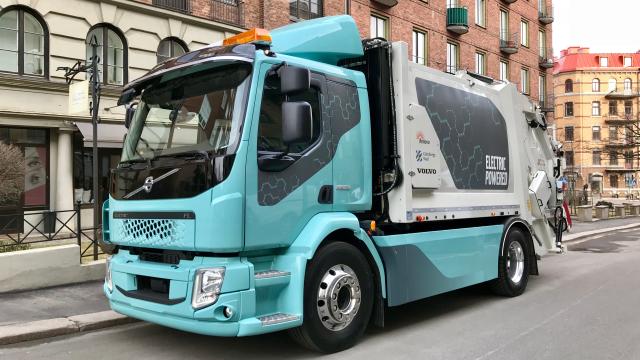The Environmental Protection Agency announced Tuesday it plans to better regulate the pollutants spewing out of heavy-duty trucks.
Yes, this is the same EPA that wants to keep coal power plants alive, plans to scrap regulations on mercury emissions, and does not care about fuel efficiency.
Could Trump’s EPA actually be doing something helpful for our planet and health for a change? Maybe! But let’s not get too ahead of ourselves here.
The proposed “Cleaner Truck Initiative” seeks to decrease nitrogen oxide (NOx) emissions from heavy-duty trucks, which can worsen or help spur asthma and other respiratory issues when inhaled regularly.
These gases can also help contribute to the formation of smog. Nitrous oxide, a form of nitrogen oxide, also warms the planet, making up 6 per cent of U.S. greenhouse gas emissions.
The proposal to tighten NOx emissions standards, which have not been updated since 2001, began under former President Barack Obama. And while it’s a rare sign of progress for Trump’s EPA to push forward with an Obama-era regulation, this one still doesn’t go far enough, said Mustafa Ali, former environmental justice administrator at the EPA.
The U.S. emitted 14.1 million tons of NOx in 2011. In 2014, roughly half of those emissions were from vehicles. Most of those come from vehicles running on diesel like heavy duty trucks, according to a 2017 EPA document. If we were really serious about decreasing this (and all other) truck pollution, it’d mean going electric.
Obviously, this is easier said than done: Implementing a nationwide ban on fossil fuel trucks would require a complete infrastructure makeover that’d switch out gas stations for charging stations to support these vehicles.
And of course, charging stations would need to run on renewable energy for the electric vehicles to be better for the environment. If the EPA even took the miraculous step of mandating zero truck emissions, industry officials and likely even state governments would be pissed and challenge the proposal in court.
Nothing about it would be easy.
But it wouldn’t be impossible, and radical change is becoming increasingly necessary as the threat of catastrophic climate change looms. And other countries are stepping up. Spain, for example, proposed Tuesday to remove all gas-powered cars from its roads by 2040.
Other European countries and cities are also moving forward with fossil fuel car bans. If the U.S. is going to update these standards, why not go all the way?
“This is continuing to push forward with an agenda around fossil fuels,” Ali told Gizmodo. “We know that the burning of any fossil fuels, whether they’re coming out of smokestacks or tailpipes, continue to have impacts in communities of colour, low-income communities, and indigenous lands.”
He’s right: In 2017, University of Washington researchers published findings on nitrogen dioxide emissions nationwide, which largely come from transportation, and found that people of colour experienced higher exposure to this pollutant between 2000 to 2010.
That’s why advocacy organisations like the Moving Forward Network have been urging the EPA to implement zero-emissions technologies in heavy-duty trucks since at least 2016.
The communities that live day to day exposed to pollution from truck traffic are sure to welcome any relief. The EPA could always, however, go a step further to ensure no communities need to bear the burden of unhealthy air.
